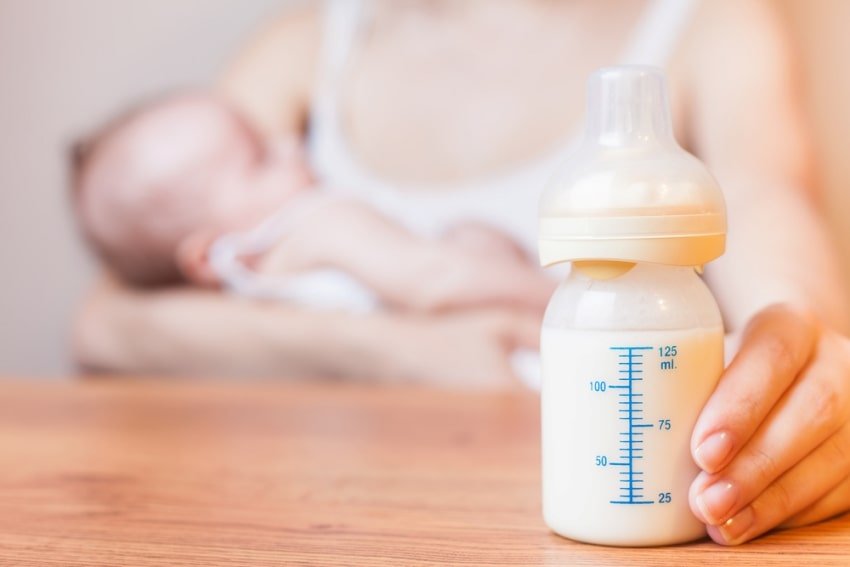If you have decided to breastfeed, you may be wondering about extended breastfeeding and the pros and cons. Some moms will breastfeed for a few days, some a few months, and others a few years. It is every mom’s choice how long she breastfeeds her baby.
No mom will have the exact same breastfeeding journey as another mom and her baby.
Breastfeeding is natural but also challenging for many and some moms may have to stop while their baby is still a newborn but others have a three-year-old who is still nursing.
Neither of these feeding journeys is wrong and if you are contemplating extended breastfeeding then don’t let others influence your decision.
The term ‘extended breastfeeding’ can be a bit confusing though, right? What exactly is extended breastfeeding? Is it feeding for more than 6 months, 12 months, or for over a year?
In this article, we discuss what extended breastfeeding is to clear up any confusion. We have also highlighted all of the pros and cons of extended breastfeeding.
This article will provide you will all the information you need to help you make an informed decision about whether extended breastfeeding is the right path for you and your baby.
What Is Extended Breastfeeding?
The World Health Organisation (WHO) recommends that all babies are exclusively breastfed until they are 6 months old. According to WHO, exclusively breastfeeding for the first six months will provide your baby with all the nutrition they need for optimal health, growth, and development.
After the first six months, parents will then begin the weaning process where they offer age-appropriate foods alongside their baby’s usual milk feeds. Over time babies begin to ‘drop’ their milk feeds and breastfeed less often as more and more solid foods are introduced into their diet.
However, WHO recommends that infants continue for up to two years and beyond while also eating a healthy diet.
In many countries and cultures, children are still nursing when they are around two to four years of age. However, in Western countries like the US, moms wean their children much earlier for a variety of different reasons.
Whereas in some cultures extended breastfeeding is completely normalized, here in American (and other Western countries) moms are often made to feel embarrassed and judged for continuing to nurse their toddler or preschooler.
So, When Does Breastfeeding Become Extended Breastfeeding?
View in gallery
Looking at the recommendations from WHO, it could be argued that extended breastfeeding is when a mom continues to feed her child after they turn two. However, the phrase ‘extended breastfeeding’ is frequently used when referring to nursing a child over 12 months of age.
If your baby has had its first birthday and you are still nursing, you can now describe yourself as an extended breastfeeding mom!
If your baby is still young and you are not sure when to stop breastfeeding, the next sections of this article should help you to decide if extended breastfeeding is for you.
Is Extended Breastfeeding Healthy?
Breastfeeding for any length of time is healthy. Breastmilk is tailor-made to meet your baby’s nutritional needs and has the perfect balance of vitamins, minerals, and fats to help your baby grow and develop.
Breastmilk will also help to strengthen your baby’s immune system through the antibodies present in your milk. It is no secret that breastmilk is the healthiest milk you can give your baby and it does not lose its health benefits the older your baby gets.
Extended breastfeeding is healthy. We will delve into this more when we discuss the extended breastfeeding pros and cons.
At What Age Is Breastfeeding No Longer Beneficial?
Breastfeeding will always be beneficial. Your milk will not cease to be a healthy source of nutrition for your child the second they turn three years old.
As your baby grows they will no longer rely completely on breastmilk for nutrition; extended breastfeeding should not be thought of as a substitute for weaning a child onto solid food.
Children who are breastfed for over a year eat regularly just like their toddler friends who weaned months ago.
View in gallery
Breastfeeding is much more than food and while your child is getting the nutrition they need from solid food, they can still benefit from all the goodness in breastmilk too.
There is some argument that extended breastfeeding is not beneficial for healthy attachment and psychological development in children.
However, for every person who argues it is not good for children to breastfeed after their first birthday, there is a mom proudly shouting about the bond she has with her nursing two-year-old and how he is just as independent as his non-nursing peers.
Breastfeeding is an emotive subject but it is important to know that breastmilk does not stop having all of its health benefits just because your baby has turned one.
The Pros Of Extended Breastfeeding
There are several reasons why moms decide to continue breastfeeding after their baby’s first birthday. Here is a list of some of the benefits of extended breastfeeding:
Breastmilk helps build a strong immune system
Your Baby’s immune system is really important and it can help to quickly fight off infections and illnesses. Babies are not born with a very good immune system but breastmilk helps infants to develop a strong and healthy one.
Moms are able to pass antibodies they have in their own bodies into their breastmilk and onto their baby. Breastfeeding is an easy way to boost your child’s immunity against various illnesses.
There have been several reported stories of nursing moms noticing their milk changes color when their baby is sick.
This happens because the mom’s body has detected germs in the baby’s saliva during nursing and her body has responded by making the necessary antibodies needed to fight off the illness – how amazing is that?
These immune system benefits will not ever stop, so the longer you breastfeed your child for the more antibodies you will provide them to help strengthen and boost their immune system.
View in gallery
Breastmilk continues to have nutritional value
An apple is still just as healthy if it is eaten by a five-year-old or a thirty-five-year-old. Similarly, breastmilk doesn’t stop being healthy the older your child becomes.
Babies and children of all ages can benefit from the nutritional goodness found in breastmilk.
Breastfeeding is an easy way to provide your child with Vitamin A, calcium, protein, and many other vitamins that are crucial for healthy growth and development. Breastmilk is a healthy and nutritious substance, no matter how old your child is.
Breastfeeding has health benefits for moms
It is not just babies who benefit from extended breastfeeding. Research has discovered that moms who breastfeed reduce their risk of developing several life-threatening illnesses and diseases.
It has been found that breastfeeding moms are less likely to get breast cancer, ovarian cancer, and endometrial cancer.
The longer a mother breastfeeds, the more she reduces her risk of developing heart disease, diabetes, hypertension, and obesity. If a mom continues breastfeeding she also continues to protect her own health too.
Nursing is calming for mom and baby
We have all been there, right? Baby inconsolably screaming and then suddenly the crying stops once you latch them onto the breast.
If you have formed a good nursing relationship with your child, breastfeeding an upset toddler is an easy way to soothe a bumped head or help them calm down from a tantrum.
Whenever you breastfeed oxytocin is released in your and your baby’s brain. Oxytocin is often referred to as the ‘love hormone’ and it helps to relax both you and your baby during nursing and after the feed is over. The calming benefits of breastfeeding will continue no matter how old your baby is.
It is an easy drink
View in gallery
Breastmilk is still milk, it is still a way to help your baby stay hydrated and quench their thirst. You may be out in the playground and have forgotten the
Sippy cup or you have no money for some juice from the store, breastmilk is a drink that you can easily give to your child no matter where you are – and it is free!
Nursing helps you to bond
Breastfeeding is known to strengthen a mother’s bond with her baby. Thanks to the oxytocin and all the close cuddles you and your baby have, breastfeeding will help you to feel connected and closer to your baby.
Your breasts can be a quick and reliable source of comfort for your child. Sometimes children will nurse not because they are hungry or thirsty, but because they just want to feel comforted and safe in their mommy’s arms.
Nursing is a great way to instill feelings of security and safety in your child, they will grow in confidence knowing that you are always there for them if they need comforting or a cuddle.
Breastfeeding will not stop being an effective way to bond with your baby as soon as they turn twelve months old.
Psychological benefits
Although some critics of extended breastfeeding argue that nursing past one year will damage a child’s psychological development, there is no scientific proof of this.
People claim breastfeeding children for too long will make them clingy and have an unhealthy attachment to their mother. Others argue extended breastfeeding is all for the benefit of the mother and the children are being forced to continue when they want to wean.
These are just judgmental assumptions that are not backed by any real scientific research.
However, research has found that extended breastfeeding can help children to become more independent and develop secure and healthy attachments to their mothers. It has also been found that extended breastfeeding can lead to a better social adjustment in children.
The Cons Of Extended Breastfeeding
As you can see, there are several reasons why continuing to breastfeed your child after their first birthday might be a good idea. However, to help you to see both sides, here is a list of the cons of extended breastfeeding.
View in gallery
People will judge you
It is a sad fact but if you decide to breastfeed your child for longer than a year, strangers and even loved ones may be judgmental. There is a misconception that older children only continue to breastfeed because the mom doesn’t want to stop.
This simply isn’t true. It is impossible to force a child to breastfeed, there is no way a three-year-old will nurse if they don’t actually want to. Some people have misinformed opinions and think extended breastfeeding is ‘gross’ or ‘weird’.
If you decide to breastfeed your baby into childhood you may have to deal with stares and unkind comments from people in public and even from your own family.
Breastfeeding a toddler can be painful
Just like establishing breastfeeding can be painful, so can feeding a toddler. Teeth can graze your nipple during feeds and some children even bite their mom during nursing.
Older babies and toddlers often try to move around a lot during feeds, twisting and stretching your breast while it is still in their mouth.
This won’t happen at every single feed but it is important to be aware that older infants and toddlers don’t tend to sit still and sleep in your arms, the same way a newborn baby does.
It is a big commitment
Breastfeeding is a big commitment. If your child relies on nursing to be able to fall asleep, for comfort when they are sad or if breastfeeding is an integral part of the bedtime routine, it can be hard to leave your child.
If you want a night away or even a week’s break away without your child, this may not be possible if your child can’t cope with no breastmilk for a long period of time.
The longer you breastfeed for the more difficult it may feel for you to leave your toddler, knowing you are taking their breastfeeding time away from them too.
View in gallery
More sleepless nights
Many parents who decide to breastfeed their baby for longer than 12 months, also either bed share or are still feeding their baby throughout the night.
Your baby may rely on the breast to fall asleep and this could mean that when they wake in the night they cannot soothe themselves back to sleep. Nursing at night is challenging and exhausting and you are only going to feel more tired the longer you experience sleepless nights for.
It can be embarrassing
There is a societal stigma in the West surrounding breastfeeding an older child. In some cultures, nursing toddlers and preschoolers are completely normalized and no one would ever think to make a nasty remark to a mom feeding her four-year-old in public.
However, in this country people still have a negative view of moms who feed older babies and this can make feeding in public embarrassing. If your child can talk, it can be embarrassing if they start demanding breastmilk while you are out in public.
Your baby might depend on nursing too much
Some people argue that the longer you breastfeed for the more reliant your child will become on you for comfort and sleep, for example. Whilst this may not be an issue for some moms, for others, it is a deal-breaker.
It is natural to want personal space and to ‘get your body back’ after pregnancy and nursing and some moms worry this won’t be possible with their child still wanting to breastfeed regularly.
It can make weaning difficult
Many moms fear that the longer they nurse their child the more difficult weaning will be. While it may take a while to transition a baby from breastmilk to formula it can be done fairly easily.
However, it can be much more upsetting to refuse breastmilk to an older child who is asking for it politely and has always been allowed to nurse whenever they want.
It is not impossible to wean an older child off the breast though, many moms who choose extended breastfeeding simply wait for their child to self-wean (this is when breastfeeding stops because the child has decided, not the mom).
View in gallery
If you are the one wanting to end the nursing journey first, this can be an emotionally challenging time for you and your child.
FAQs
How long is too long breastfeeding?
The American Academy of Pediatrics recommends exclusive breastfeeding for the first 6 months of life and to continue for at least the first 12 months of your baby’s life. But in other countries, it is recommended that you continue to breastfeed up to the age of 2 or beyond.
Is breastfeeding a 4 year old normal?
Not so much in America but in other parts of the world it is common that toddlers aged 4 to 5 years old are still being nursed by their moms for both bonding and health reasons.
The Final Thought
There are lots of extended breastfeeding pros and cons. Some moms will easily be able to breastfeed for the first two years and others may decide they don’t want to deal with judgment from others and stop breastfeeding as soon as their baby turns one.
There are many positives to breastfeeding your baby into toddlerhood and beyond and there are also some extended breastfeeding problems that moms encounter.
Deciding when to stop breastfeeding can be a hard decision to make but we hope this article has helped you to figure out if extended breastfeeding is for you.
For all the information you need on breastfeeding, check out our ultimate guide here.






